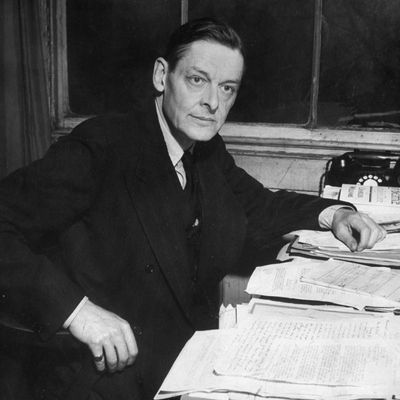
T.S. Eliot, creator of Cats, (essentially), needs you to know something. He did not have sex with Emily Hale, his crush, friend, and muse, whom he wanted to marry in his youth but did not. And, you know, he’s actually glad he didn’t marry her. Like, actually he dodged a bullet and, when you really think about it, he’s lucky? So.
The information comes from a letter T.S. Eliot wrote to be released when a collection of his letters to Emily Hale, which she donated to Princeton University in 1956, were unsealed. It is intended to serve as his side of the story. The unsealing’s stipulation was that it came 50 years after either Hale or Eliot died, whichever came second. Eliot died in 1965; Hale died in 1969. The letters were unsealed on Thursday.
There is a lot of tumult to be discovered in Eliot and Hale’s relationship, and I invite you to uncover it for yourself. But we can delight in a few passages from his posthumous letter together now, which I believe you will agree are quite dramatic and, of course, very sexy.
Eliot confessed his love to Hale around 1913; she did not reciprocate his affection, and he moved to Europe to marry Cambridge governess Vivienne Haigh-Wood, unhappily. “Emily Hale would have killed the poet in me,” he wrote of his luck. “Vivienne nearly was the death of me, but she kept the poet alive.”
They continued to correspond through Eliot and Vivienne’s separation (1932) and her death in a psychiatric hospital (1947), though Eliot wrote that, upon reflection, his love for Hale had faded. “I came to see that my love for Emily was the love of a ghost for a ghost, and that the letters I had been writing to her were the letters of a hallucinated man, a man vainly trying to pretend to himself that he was the same man that he had been in 1914.” Mmhm, mhm.
And you know, they never even did it. “I might mention at this point that I never at any time had any sexual relations with Emily Hale.”
So, that’s that, then.
Daniel Linke, interim head of special collections at Princeton University Library, told the Associated Press he thinks the rush from scholars to see the archives will be “the special collections equivalent of a stampede at a rock concert.” Aw. The copyrighted collection will only be available to view in-person, without cellphones. Laptops and paper, for taking notes, are allowed.
So, are you the “T.S. Eliot” or the “Emily Hale” of your relationship? A fun game to play with your partner tonight.

